India, Canada share 5 golds as Commonwealth Games comes to close
Saturday, August 6, 2022 - 23:19 By Vinay Siwach

COVENTRY, England (August 6) -- As the Commonwealth Games came to a close, two of the most successful countries in the history of the Games -- Canada and India -- established their supremacy, sharing five of the six gold medals on offer on Saturday.
India won the freestyle golds at 57kg and 74kg along with the 53kg gold in women's wrestling. Canada had two champions on Saturday with Justina DI STASIO (CAN) winning the 76kg gold while Nishant RANDHAWA (CAN) winning the 97kg gold.
Miesinnei GENESIS (NGR) was the other champion on Saturday as she claimed the third women's wrestling gold for Nigeria by winning the 50kg weight category.
But two wrestlers who stood out at the Coventry Arena were Olympic silver medalist Ravi KUMAR (IND) and world bronze medalist Vinesh PHOGAT (IND).
Kumar finished all three of his bouts well before the six minutes and showed the gulf in class in 57kg in Birmingham.
Wrestling Nigeria’s multiple-Commonwealth medalist Ebikewenimo WELSON (NGR) in the final, Kumar used a leg lace to lead 8-0 before getting a takedown in the second period to finish the bout 10-0.
This was Kumar’s first medal at the Commonwealth Games.
“It’s always special to win the medal at Games and this was also special,” Kumar said. “Tokyo silver was special and so is this medal.”
Kumar, hoping to win a World Championships medal in Belgrade, has been on an incredible run, winning three golds and losing only one bout since Tokyo.
He did give up four points in the semifinal against Asad ALI (PAK) but said that it was more about getting stuck in a move.
"It's wrestling and sometimes we get stuck in a move," he said. "I can't say I was off guard or wasn't moving well. Just a move I got stuck in and he managed to score."
 NAVEEN (IND), red, defeated Muhammad TAHIR (PAK) 9-0 in the 74kg final. (Photo: UWW / Helena Curtis)
NAVEEN (IND), red, defeated Muhammad TAHIR (PAK) 9-0 in the 74kg final. (Photo: UWW / Helena Curtis)
NAVEEN (IND) added another gold to India’s account as he dominated the 74kg field and defeated Muhammad TAHIR (PAK) 9-0 in the gold bout.
Tahir was put on passivity as well when Naveen continued his attacks. Four takedowns gave him the eight other points.
A bronze medalist at the Asian Championships, Naveen will try to make the Indian team at 74kg for the World Championships.
 Nishan RANDHAWA (CAN) became the Commonwealth Games champion at 97kg. (Photo: UWW / Helena Curtis)
Nishan RANDHAWA (CAN) became the Commonwealth Games champion at 97kg. (Photo: UWW / Helena Curtis)
At 97kg, Nishan RANDHAWA (CAN) defeated two U20 World bronze medalists en route to winning the gold medal with some tough wins.
In the quarterfinal, he wrestled Deepak NEHRA (IND) and almost suffered a loss as Nehra was leading 6-6 on criteria with nine seconds remaining. But Randhawa scored a stepout and got the all-important point to win 7-6 and reach the semifinals. He managed to beat Tayab RAZA (PAK) 7-0 to make it to the final.
"Nehra was defending very well and it was a back-and-forth match," Randhawa said. "But I knew I have enough time to score a takedown. He went to the zone and I capitalized with the stepout."
He wrestled another U20 world bronze medalist in the final in Nicolas DE LANGE (RSA) and made it look easy with a 9-3 win for the gold.
"I have wrestled him before at the U20 Worlds and I know his style," he said. "It's great to win the gold here."
Randhawa, a U20 bronze medalist himself, will now be hoping to medal at the senior World Championships in Belgrade, Serbia.
"I train in Iowa and I believe in my potential," he said. "As you train with the best in the world, you keep improving and hopefully I will be able to beat the wrestlers at 97kg. If not now, then when?"
 Vinesh PHOGAT (IND) claimed her third consecutive Commonwealth Games gold medal. (Photo: UWW / Helena Curtis)
Vinesh PHOGAT (IND) claimed her third consecutive Commonwealth Games gold medal. (Photo: UWW / Helena Curtis)
Vinesh wins third gold
Her cousin sister Geeta PHOGAT (IND) may be the first Indian woman to win the Commonwealth gold but Vinesh PHOGAT (IND) became the first woman from the country to win it three times.
In a confidence-boosting gold win in Birmingham, Phogat defeated world bronze medalist Samantha STEWART (CAN) and African champion Mercy ADEKUOROYE (NGR) in Round 1 and Round 2 to all but confirm the gold in the morning session.
She pinned Stewart and almost pinned Adekuoroye but the Nigerian was in danger position for close to two minutes and lost 6-0.
"It's a good confidence-boosting win for me," Phogat said. "Canada and Nigeria do pose a challenge in this tournament but thankfully I managed to win here."
 Miesinnei GENESIS (NGR) celebrates after winning the 50kg gold medal in Birmingham. (Photo: UWW / Helena Curtis)
Miesinnei GENESIS (NGR) celebrates after winning the 50kg gold medal in Birmingham. (Photo: UWW / Helena Curtis)
At 50kg, Madison PARKS (CAN) and Miesinnei GENESIS (NGR) were involved in a close battle in the gold medal bout with Parks scoring a stepout when she was put on the activity clock. But Genesis took a 1-1 criteria lead and as the match entered the final minute, it looked like Genesis will hang on for a 1-1 win but hit a lateral drop and secured the fall to win Nigeria's third gold medal in women's wrestling.
As she was trailing, Parks went for a single leg shot but got countered for the pin. She had made a stunning comeback in the semifinals against Pooja GEHLOT (IND). After giving up a six-point lead, Parks slowly worked her way with takedowns and made it 6-4. She scored a takedown with nine seconds remaining on the clock. Gehlot, hoping to keep her one-point lead, moved away but Parks sprung to action and hit a huge underhook for four to win 9-6.
Genesis was the third gold medalist for Nigeria after Odunayo ADEKUOROYE (NGR) and Blessing OBORUDUDU (NGR) won the gold at 57kg and 68kg respectively.
 Justina DI STASIO (CAN) hit a four against Hannah RUEBEN (NGR) in the 76kg final. (Photo: UWW / Helena Curtis)
Justina DI STASIO (CAN) hit a four against Hannah RUEBEN (NGR) in the 76kg final. (Photo: UWW / Helena Curtis)
The final gold of the night went to former world champion Justina DI STASIO (CAN) who defeated Hannah RUEBEN (NGR), 4-2, in the final to capture her first Commonwealth Games gold.
Her's was the only big move of the final as she hit a four-pointer against Rueben who managed to score only two points.
Earlier in May, Di Stasio made a comeback to the sport after two years and managed to win a bronze medal. But with ambitions of winning the World Championships gold as she did in 2018, Di Stasio got a big shot in the arm with the gold in Birmingham.
RESULTS
Freestyle
57kg
GOLD: Ravi KUMAR (IND) df. Ebikewenimo WELSON (NGR), 10-0
BRONZE: Asad ALI (PAK) df. Suraj SINGH (NZL), 11-0
BRONZE: Darthe CAPELLAN (CAN) df. Jakobo TAU (RSA), 12-2
74kg
GOLD: NAVEEN (IND) df. Muhammad TAHIR (PAK), 9-0
BRONZE: Jasmit PHULKA (CAN) df. Cole HAWKINS (NZL), 10-0
BRONZE: Ogbonna JOHN (NGR) df. Charlie BOWLING (ENG), 10-0
97kg
GOLD: Nishan RANDHAWA (CAN) df. Nicolaas DE LANGE (RSA), 9-3
BRONZE: Thomas BARNS (AUS) df. Maulalo ALOFIPO (SAM), 12-0
BRONZE: Deepak NEHRA (IND) df. Tayab RAZA (PAK), 10-2
Women’s Wrestling
50kg
GOLD: Miesinnei GENESIS (NGR) df. Madison PARKS (CAN), via fall
BRONZE: Pooja GEHLOT (IND) df. Christelle LETCHIDJIO (SCO), 12-2
53kg
GOLD: Vinesh PHOGAT (IND)
SILVER: Samantha STEWART (CAN)
BRONZE: Mercy ADEKUOROYE (NGR)
Key bout: Vinesh PHOGAT (IND) df. Samantha STEWART (CAN), via fall
76kg
GOLD: Justina DI STASIO (CAN) df. Hannah RUEBEN (NGR), 4-2
BRONZE: Pooja SIHAG (IND) df. Naomi DE BRUINE (AUS), 10-0
BRONZE: Georgina NELTHORPE (ENG) df. Madusu KOROMA (SLE), via fall

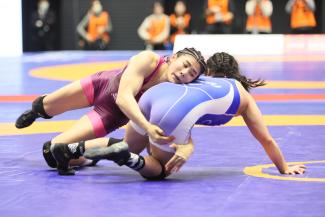
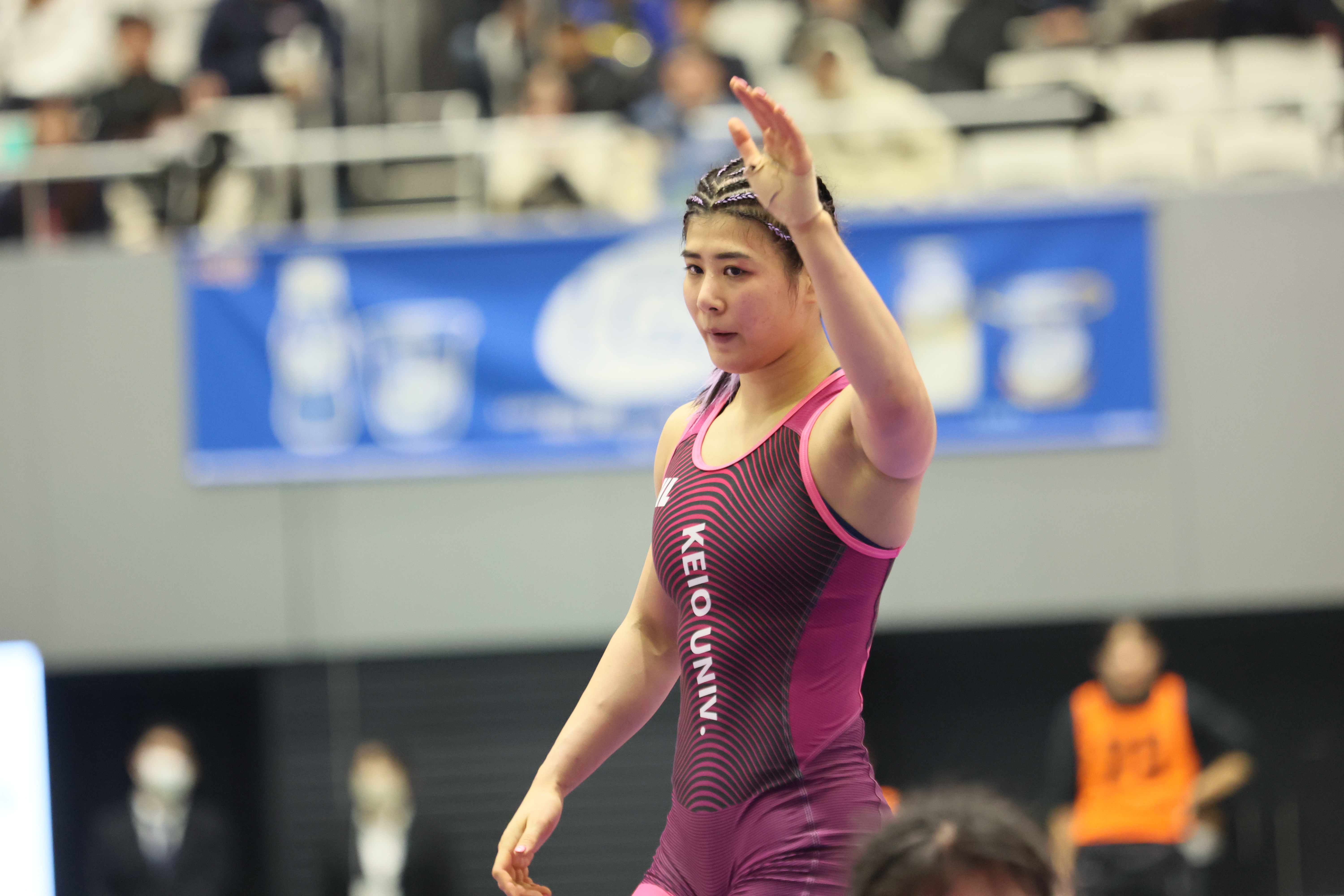 Nonoka OZAKI will wrestle Sakura MOTOKI in the 62kg final. (Photo: Takeo Yabuki / wrestling-spirits.jp)
Nonoka OZAKI will wrestle Sakura MOTOKI in the 62kg final. (Photo: Takeo Yabuki / wrestling-spirits.jp)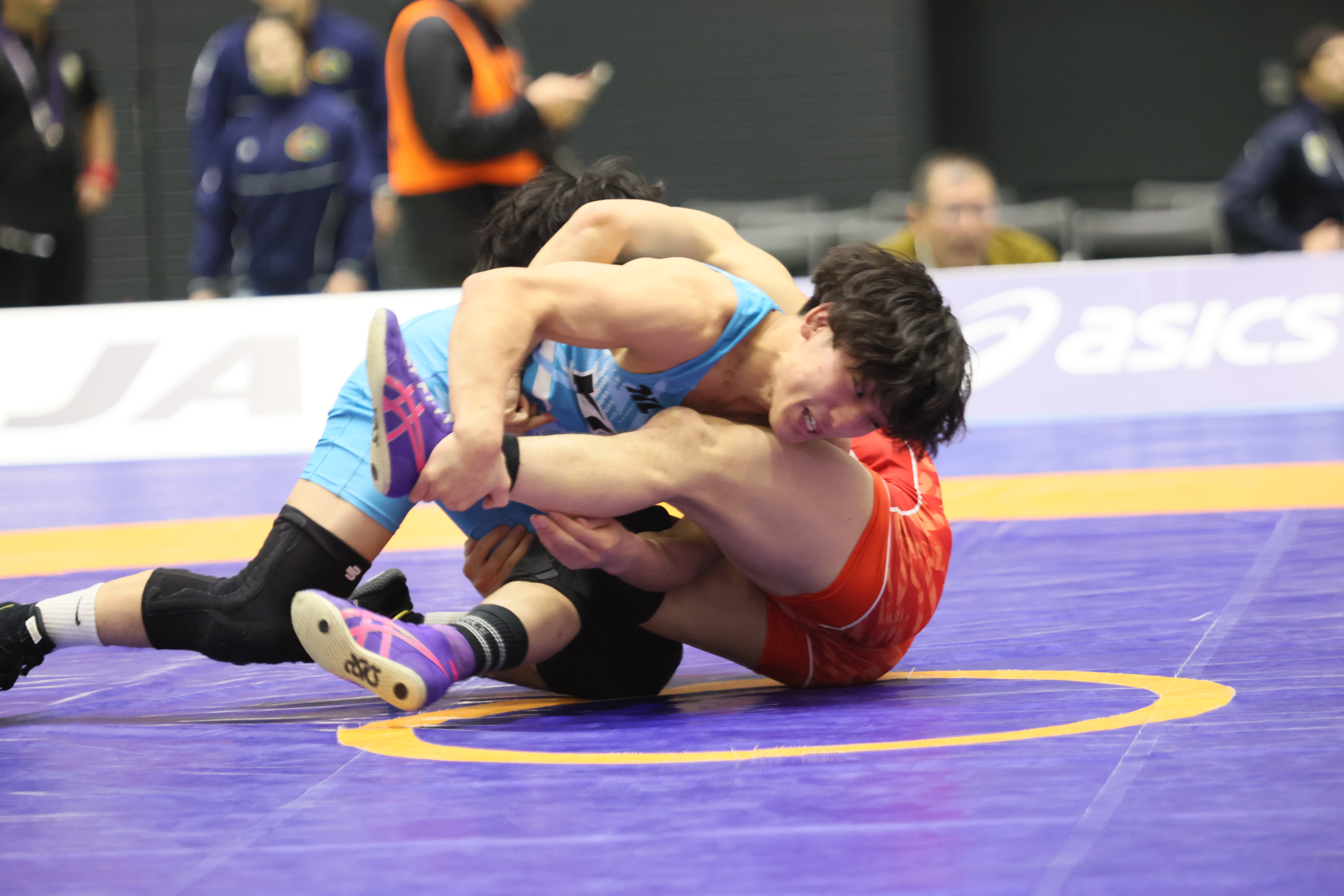 Takara SUDA, left, works for a takedown in the first period against Kaisei TANABE during their 65kg semifinal. (Photo: Takeo Yabuki / wrestling-spirits.jp)
Takara SUDA, left, works for a takedown in the first period against Kaisei TANABE during their 65kg semifinal. (Photo: Takeo Yabuki / wrestling-spirits.jp)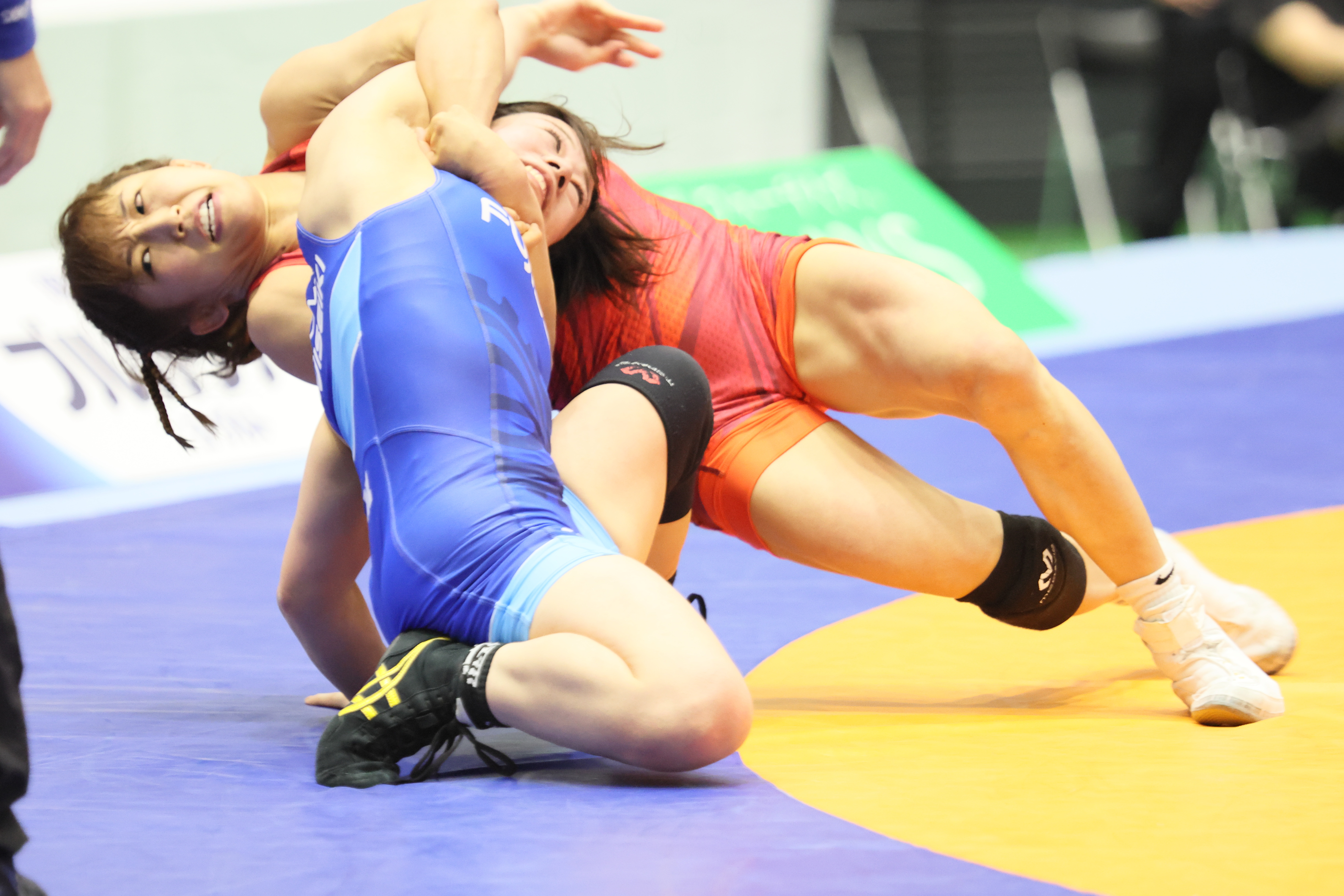 Yui SUSAKI throws Mako ONO en route to a technical fall in their 50kg semifinal. (Photo: Takeo Yabuki / wrestling-spirits.jp)
Yui SUSAKI throws Mako ONO en route to a technical fall in their 50kg semifinal. (Photo: Takeo Yabuki / wrestling-spirits.jp)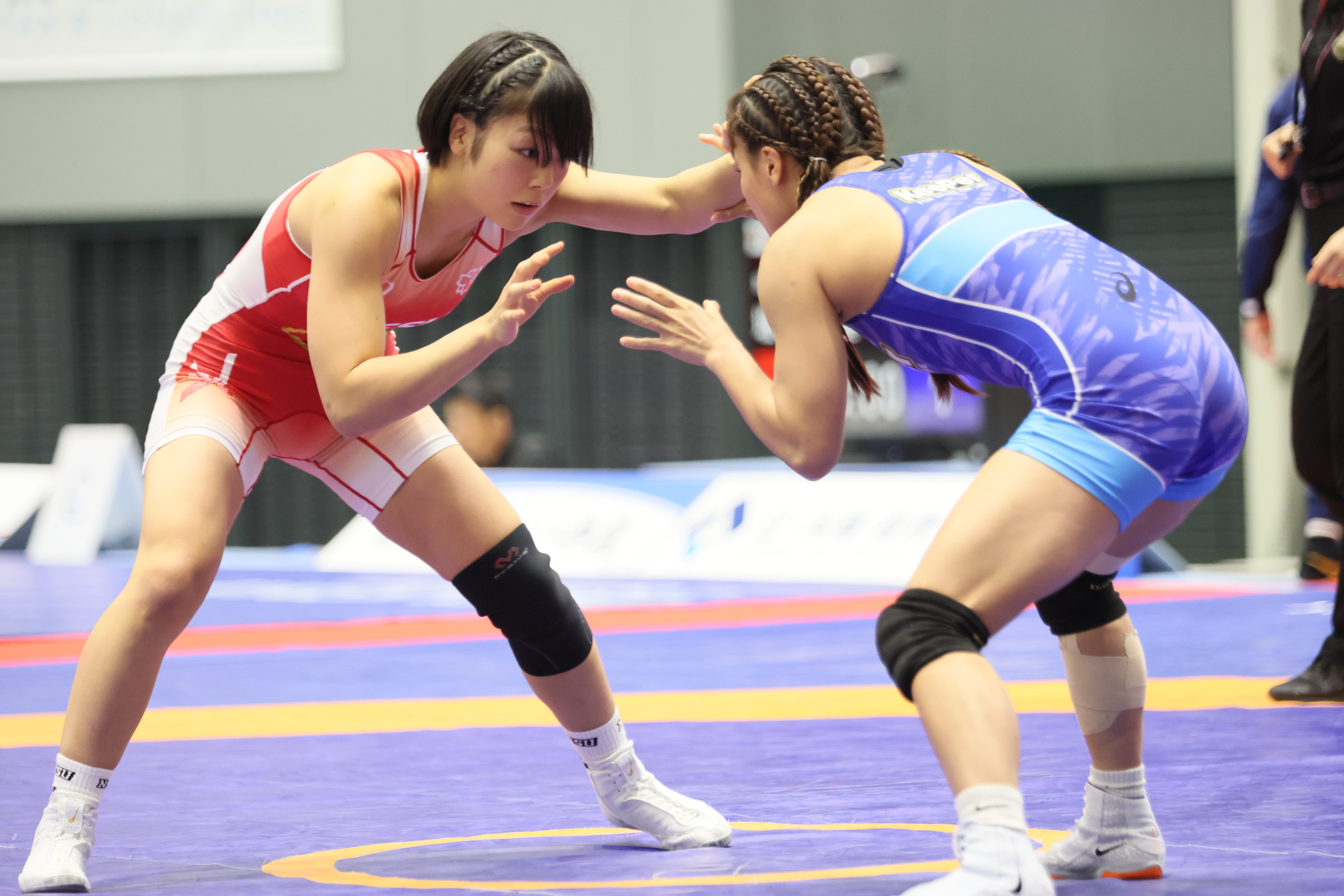 Akari FUJINAMI, left, squares off with Sara NATAMI in the 57kg semifinals. (Photo: Takeo Yabuki / wrestling-spirits.jp)
Akari FUJINAMI, left, squares off with Sara NATAMI in the 57kg semifinals. (Photo: Takeo Yabuki / wrestling-spirits.jp)
Share your thoughts.
Comments